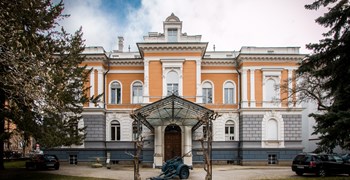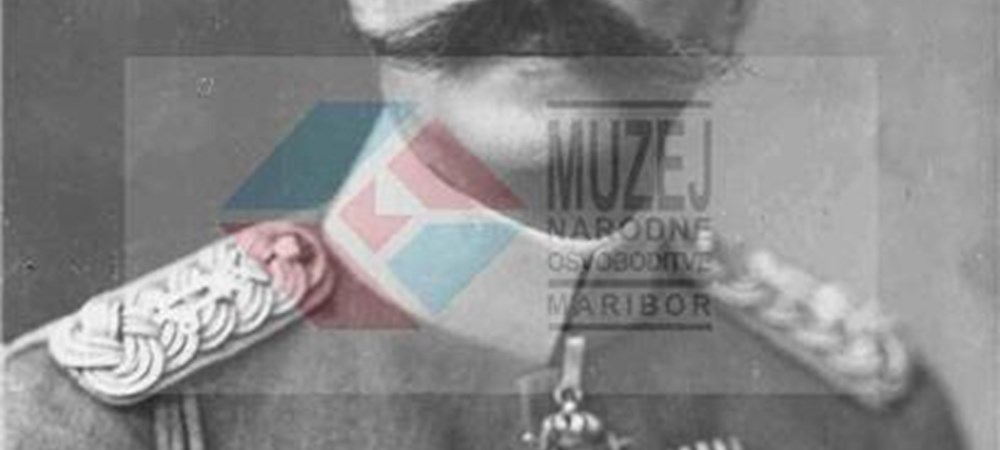Rudolf Maister' Day
At the end of October 1918, the National Council for Styria achieved that the State governorship in Graz named Slovenians for leaders of county districts in Slovenian Styria. The Slovenians took over the districts on 1 November 1918. On the same day, major Rudolf Maister met Maribor city command and surprised the officers with his firm attitude, deposed city commander, colonel Anton Holik, and took over the military power in Maribor and Slovenian Styria. The National Council awarded major Maister with the rank of general and increased his authority. On 1 November 1918, Maribor joined the State of Slovenes, Croats and Serbs. General Maister dismissed the foreign army and kept the Slovenian soldiers in the town. In the first days of November, captain Edvard Vaupotič that took over the barracks on the left bank of the Drava River, and noncommissioned officer Jožko Slobodnik, who led the Slovenian artillery and cavalry on the right bank of the Drava River, supported him immensely. Lieutenant Jože Malenšek was named commander of the 1st Yugoslavian company and a few days later major Franc Cvirn took over the city command.
With the takeover of military authority and county districts only the primary foundations for Slovenian Maribor were set. Municipality, court, post office, railway, banks, school etc. remained in German hands. On 30 October 1918, the city council of Maribor Municipality, in which there wasn’t even one Slovenian citizen, adopted a decision with which Maribor and its wider hinterland became a part of the new country, German-Austria. During this time, the Maribor Germans were afraid the most of the soldiers that were returning home from the front. To avoid national tensions they were prepared to indulge the Slovenians. For negotiations with them they established the Town Executive Committee, whose members were Heinrich Wastian, Dr. Ernest Mravlag and Hans Suppanz. The Slovenians did nothing without a consensus. They even gave up the 47 infantry regiment that fulfilled Maister’s order on 3 November and left for German-Austria. On 3 November 1918, with the consensus of National Council and general Maister they established the security guard—Schutzwehr (the Slovenians called it the Green Guard). From the military point of view it was subordinate to general Maister and maintained by the Municipality. Due to the lack of Slovenian soldiers the status of Slovenians in Maribor drastically worsened and the status of Germans improved. On 12 November 1918, the German City Council celebrated the establishment of German-Austria. It re-adopted the decision that Maribor is a part of German-Austria. It connected with Maribor social democrats that had a strongly German-oriented organization. Ten social democrats were included into the city council and were given the position of the second deputy mayor. With constant new reinforcement, the Green Guards started to become a threat to the Slovenian army in Maribor. There were tensions between them and even shootings took place.
To improve the status of Slovenians in Maribor one had to fortify the Slovenian army. Approximately 400 soldiers arrived from Celje to Maribor. Some of the soldiers that returned from the fronts stayed here. General Maister unsuccessfully asked the II war district in Ljubljana for military help. Since he didn’t get any army there, he decided for mobilization, which was financially supported by the loan bank at the National Hall in Maribor with 2 million crowns. So many soldiers gathered that on 21 November 1918 the Maribor infantry regiment was established. In the middle of November, the military transports stopped and the Slovenian army became strong enough, which enabled general Maister to disarm the Green Guard in a well-prepared action on 23 November 1918. With this action, the Slovenians were again superior in Maribor and used this status well. They took over the court, the post office, the railway, some of the schools, gendarmerie and on 2 January 1919 the town administration. Taking over the German offices led to a grand strike at the court, post offices, the railway, at the railway workshop and at the boiler room that lasted from 29 November until 14 December 1918. The strike was unsuccessful but it did accelerate the introduction of the Slovenian language as the official language. The organizers of the strike, the clerks who did not speak Slovenian and also those that the Slovenian organizations characterized as German hawks were dismissed.
After disarming the Green Guard, the Slovenian army started to occupy the territory along the northern national border. On 25 November, the Maribor infantry regiment company occupied Spielfeld. Colonel Rudolf Passy was instantly sent from Graz to Maribor to find out what the following Slovenian plans were. General Maister signed an agreement with him, according to which the Slovenian army would be among others allowed to occupy the territory in Styria and Carinthia even a little bit across the national border. The agreement was never realized but it did influence the management in Graz to allow Maister’s units occupy Radgona (Bad Radkersburg), Špilje (Spielfeld), Lučane (Leutschach), Marenberg (Radlje) and Dravograd. In the beginning of November, the Mežica valley was occupied by the lieutenant Franjo Malgaj unit, which arrived from Celje. In the middle of November it joined the Maister’s Styrian border command. The territory spread from the Hungarian-Croatian border to Pliberk (Bleiburg). By Maister’s order, the Slovenian army occupied Bleiburg, Völkermarkt, Griffen, Lavamünd, St. Paul and Tinje in Carinthia and gradually advanced towards Klagenfurt. Those places were occupied by the army with low resistance as it included Serbian soldiers, ex Austrian prisoners of war, in its troops and represented them as entente detachments. The occupation of territory towards Klagenfurt alarmed the Germans. On 5 December 1918, in Klagenfurt, the Carinthian temporary provincial assembly decided they needed to resist the invasion of Yugoslav company if they couldn’t identify themselves with documents as real entente troops. On 15 December, in Grafenstein, the Austrian army surrounded the mixed Slovenian-Serbian unit that arrived from Völkermarkt a day before. It captured it with no resistance because they were not able to identify themselves as an entente unit. The Slovenian success in Carinthia was thus over. The Slovenian army left some places on its own accord and was banished from others. In 1919, north of the Drava River, the Slovenian army succeeded only in defending the Völkermarkt bridgehead. At the end of December 1918, the second war district was limited to the territory between Radgona and Dravograd by the Styrian border command. A new Border command for Eastern Carinthia was established.
On 1 December 1918, the State of Slovenes, Croats and Serbs joined with the Kingdom of Serbia into the Kingdom of Serbs, Croats and Slovenes. The union was celebrated in Maribor on 15 December with a big parade through town and with a celebration in front of the National Hall.
In January 1919, the representatives of the American Study Committee, operating in Vienna, visited Maribor twice under the leadership of lieutenant colonel Sherman Miles. For the arrival on 27 January 1919, the Germans wanted to show to the Committee that Maribor was a German town. They decorated it with German flags and organized demonstrations that ended in hustling, disorder and shooting at the Main Square. Nine demonstrators were killed, eighteen were seriously wounded. Such end to demonstrations only confirmed Miles’ affection towards German-Austria.
On 14 January 1919, there were conflicts at the national border in Lučane, at the beginning of February by the Mura River between Radgona and Cmurek and on 12 March 1919 near Sobota. After the conflicts near Radgona, the negotiations between Graz and Ljubljana provincial administration started in Maribor. On 13 February 1919, the Maribor Treaty was signed, defining the borderline, valid until the signing of Peace Treaty. The Peace Conference in Paris confirmed that border line with minor changes as state border. The delegation of a French mission in Zagreb was present at the negotiations in Maribor.












